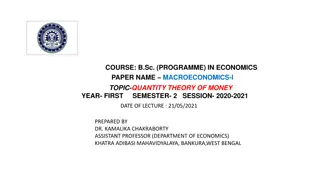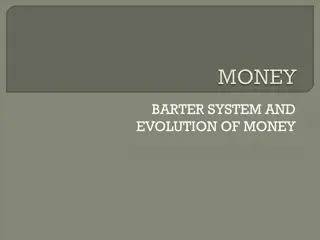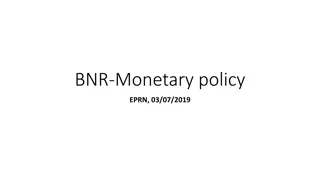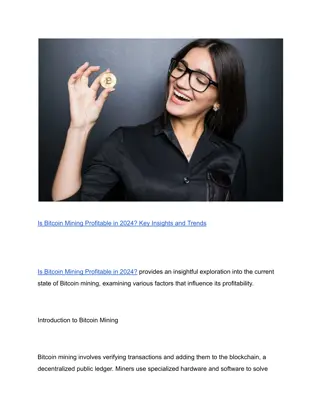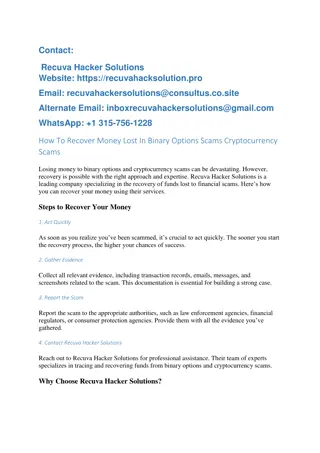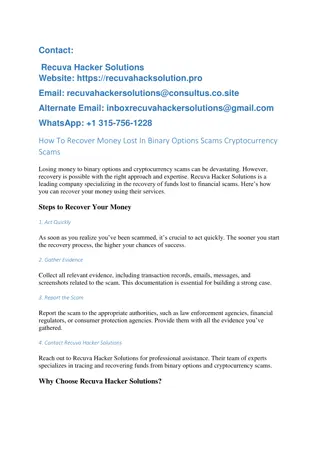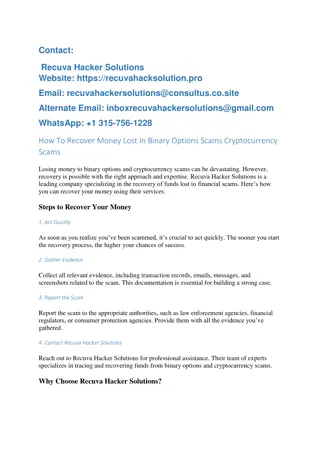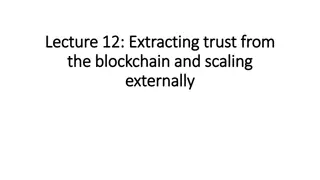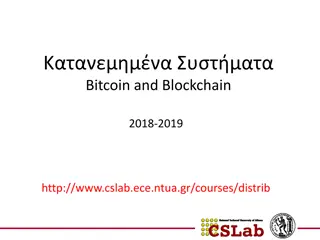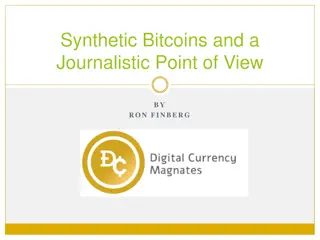
Bitcoin: The Legitimacy Crisis in Money Systems
Delve into the legitimacy crisis facing current money systems, the emergence of Bitcoin as a proposal, and the governance challenges surrounding money and finance. Explore the concepts of input and output legitimacy, hierarchies, market mechanisms, and the community-driven nature of innovative projects like Bitcoin.
Download Presentation

Please find below an Image/Link to download the presentation.
The content on the website is provided AS IS for your information and personal use only. It may not be sold, licensed, or shared on other websites without obtaining consent from the author. If you encounter any issues during the download, it is possible that the publisher has removed the file from their server.
You are allowed to download the files provided on this website for personal or commercial use, subject to the condition that they are used lawfully. All files are the property of their respective owners.
The content on the website is provided AS IS for your information and personal use only. It may not be sold, licensed, or shared on other websites without obtaining consent from the author.
E N D
Presentation Transcript
BITCOIN AND THE LEGITIMACY CRISIS OF MONEY BY BEAT WEBER Junhao Shen
1Introduction 2 The legitimation crisis of current money and payment system 3 The Bitcoin Proposal 4 Governance, input and output legitimacy 5 The current governance of money 6 Cutting out the middlemen? Bitcoin s a payment system 7 Digital gold? Bitcoin as a monetary system
INTRODUCTION virtual currency: 1 Idea was inspired from a domestic currency competition in 1976. 2 Not be considered at the publication time but be reconsidered in the wake of the recent crisis.
Legitimacy Crisis: Uneasiness about capitalism transformed into uneasiness about how money and finance work. Legitimacy = credibility and acceptability Input legitimacy: Public choices are derived from the voice and preferences of citizens and how officials are held accountable. Output legitimacy: Effectiveness in achieving goals.
LC OF CURRENT MONEY AND PAYMENT SYSTEMS Limited input Legitimacy is a precondition to output legitimacy. Controvesy on output legitimacy leads to the query of input legitimacy. Current structure of money governance is doubted by citizens which is the key reason for the birth of virtual currency and payment project Bitcoin.
BITCOIN PROPOSAL Innovative counterproposal. Community-driven, free, open-source project. peer-to-peer mimic metallic money(property): debt free, anonymous transaction, limited stock(21 million), gold mining . Emphasises the system s ability to operate without the need to trust in third-party intermediaries and without inflation.
GOVERNANCE, INPUT AND OUTPUT LEGITIMACY Governance mechanisms in managing contradictions of economic process: 1 Hierarchies 2 Markets 3 Communities
HIERARCHIES Advantage: Attaining output legitimacy is the power to secure general acceptance and certain stability of outcomes. Disadvantage: Democratic and Effective are suspectable.
MARKETS Advantage: Serving output legitimacy is usually attributed to their efficiency due to decentralised and non- formalised decision making under competition. Disadvantage: Fail to provide equal access and to produce socially desired results.
COMMUNITIES Advantage: Free and everything relies on trust :) Disadvantage: With respect to output legitimacy concern sustainability and scalability. With respect to input legitimacy, lack of formal membership and rules leads to accountability problems
METAGOVERNANCE It is where the roles of the governance mechanisms are assigned for a given field of activity and where the rules of the game are devised.
CURRENT GOVERNANCE OF MONEY What is money? The most saleable commodity became money. Then government paper money substitute commodity money due to the emergence of credit. Two approaches to the acceptance of money: 1 The state makes money legal tender and provides enforcement services.(Money emission is linked to credit. ) 2 the imposition of tax obligations on citizens by the state.( All money is credit is a bias and being in payment makes money valuable.)
Monetary system, network, must be prevalence and persistence. As long as legitimacy doesnt erode too much, network is stable. As a result, the value of money depends on the legitimacy and rules. However, if users are in a deep legitimacy crisis, then they will move upwards in monetary hierarchy.
BITCOIN AS A PAYMENT SYSTEM Cryptographic proof and anonymity. Block Chain: It is massively replicated and updated by a swarm of mutually distrustful parties running in a peer-to-peer network instead of being stored on one site only. To make this work, nodes pull transactions off of a peer-to-peer broadcast network, then compete for the opportunity to tack them on the end of the chain. To keep one party from dominating this process (and posting bad transactions), competition is enforced by making the parties solve hard mathematical problems called >proofs of work<. The integrity of the block chain is enforced using hash chaining, which makes it very difficult to change history. It s easy to add (valid) transactions at the end, but it s astonishingly difficult to tamper with the transactions that are already there. (ibid.)
OUTPUT LEGITIMACY 1 Reliability/usability: Legal and operational risks are present which threatens reliability. Require certain technical challenges which affects usability to the public. 2 Pricing It s difficult to price since cost from different conditions is undefined. 3 Privacy protection Anonymity features of Bitcoin might gain increased attraction for capital flight and political and legal risks are existed.
INPUT LEGITIMACY 1 Bitcoin allows bypassing established trusted intermediaries in the act of payment. However, it is hard to escape the need to trust a third party during the transaction process. 2 The public display of bitcoin s operating principles might be a bright spot, but it has no empowering effect for users. 3 Metagovernance is democratic.
BITCOIN AS A MONETARY SYSTEM 1 non-political, debt-free, metagovernance and meritocratic process 2 chain of digital signatures 3 Bitcoin s monetary conception has affinities with Austrian school of economics
OUTPUT LEGITIMACY 1 Multifunctionality a.Bitcoin s current volatility shows it is not suitable to be a unit of account. b.It is doubtful for Bitcoin as a payment. c.Bitcoin s main attraction consists in being an object of speculation but not functioning money. 2 Stability The Bitcoin concept doesn t aim at stability of the currency but preventing inflation.
INPUT LEGITIMACY 1 Relation to economic value creation No relations, even can t mimic gold. 2 User acceptance/exit options Adoption success is uncertain, but possibility of choice in adoption is considered. 3 Voice options The Bitcoin Foundation , based on the trust of community without force.


